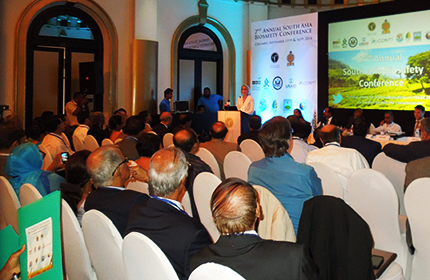2nd Annual South Asia Biosafety Conference
-

September 15, 2014-September 16, 2014
Taj Samudra Hotel
Colombo, Sri Lanka
The South Asia Biosafety Program (SABP), the Agriculture & Food Systems Institute, the Biotech Consortium India Limited (BCIL) and the Ministry of Environment and Renewable Energy (MERE), Sri Lanka, with support from the Bangladesh Academy of Sciences, and the Pakistan Academy of Sciences, organized the 2nd Annual South Asia Biosafety Conference in Colombo from 15-16 September 2014. The objective of the conference was for scientists, regulators and policy makers in South Asia to meet and discuss issues relevant to the risk assessment and regulation of genetically engineered (GE) organisms with a regional focus.
Agenda
Program Overview
The conference featured sessions on:
- Perspectives on the Regulation of Genetically Engineered Organisms in South Asia
- Research and Development of Genetically Modified Organisms in South Asia
- Biosafety and Regulation of Genetically Engineered Insects
- Tools for Science Communicators
- Agricultural Biotechnology and Adaptation to Climate Change
- Regional Harmonization of Risk Assessment Approaches in Agricultural Biotechnology
Plenary Session I: Perspectives on the Regulation of Genetically Engineered Organisms in South Asia
Biosafety Regulations in Sri Lanka: A Status Update
Prof. Athula Perera – National Science Council, Sri Lanka
Perspectives on the Regulation of Genetically Engineered Organisms in South Asia: Bangladesh Perspective
Mr. M. Solaiman Haider – Deptartment of Environment, Bangladesh
Regulation of Genetically Engineered Organisms in Bhutan
Ms. Tashi Yangzom – Bhutan Agriculture and Food Regulatory Authority, Bhutan
An Update on Indian Biosafety Regulatory System
Dr. Vibha Ahuja – BCIL, India
Biosafety Regulatory Systems in Pakistan
Dr. Muhammad Khurshid, Director General, Pakistan Environmental Protection Agency, Pakistan
Parallel Session I: Research and Development of Genetically Modified Organisms in South Asia
Transgenic Crops at ICRISAT: From Product Development to Deployment
Dr. Kiran Sharma – ICRISAT, India
Application of Reproductive Biotechnology for Improvement of Dairy Animal Productivity
Dr. M.S. Chauhan – National Dairy Research Institute, India
Genetic Modification of Several Plant Species by Transformation of Gai Mutant Dwarfing Gene for Improved Ornamental Qualities
Dr. Sriyani Peiris – University of Peradeniya, Sri Lanka
Current Status of Research and Development of GE Plants in Bangladesh
Dr. Md. Aziz Zilani Choudhury – BARC, Bangladesh
Current Status of Research and Development of GE Plants in Sri Lanka
Dr. C. Hettiarachchi – University of Colombo, Sri Lanka
Parallel Session II: Biosafety and Regulation of Genetically Engineered Insects
Virus-Resistant, Transgenic Silkworm: Development, Efficacy, and Biosafety Considerations for Commercial Scale Production
Dr. P.J. Raju – Andhra Pradesh State Sericulture Research & Development Institute, India
Biosafety, Regulatory Aspects and Performance Assessment of Transgenic OX513A Strain of Aedes Aegypti L. in India
Dr. P.B. Patil – GBIT India, India
Mosquito Control in Sri Lanka: Strategies and Challenges using Biotechnology
Prof. Wimal Abeywickrama – University of Kelaniya, Sri Lanka
Progress on the OECD Consensus Document on the Biology of Aedes Aegypti
Dr. B.K. Tyagi – Center for Research in Medical Entomology, India
Practical Experience in the Field Release of Transgenic Mosquitos
Dr. Kevin Gorman – Oxitech Ltd., UK
Regulatory Considerations and Management Practices for the Commercial-Scale Release of Transgenic Mosquitos in Brazil
Dr. Paulo Paes de Andrade – Federal University of Pernambuco, Brazil
Parallel Session III: Tools for Science Communicators
New Media for Science Communication
Mr. Amit Agarwal – Digital Inspiration, India
The Importance of Social Media: Twitter 101
Mrs. Libby Williams – Agriculture & Food Systems Institute, USA
Digital Story-Telling for Science Communications and Agricultural Development
Mr. Vinay Kumar – Digital Green, India
Putting Communications Theory into Practice
Dr. Gita Bamezai – Indian Institute of Mass Communication, India
Plenary Session II: Agricultural Biotechnology and Adaptation to Climate Change
The Impact of Climate Change on Agricultural Productivity in South Asia
Dr. Lareef Zubair – Foundation for Environment, Climate and Technology, Sri Lanka
Addressing Crop and Livestock Productivity Constraints Caused by a Changing Climate: The Role of Agricultural Biotechnology
Dr. Swapan Datta – ICAR, India
New Plant Technologies to Address Climate Change: Opportunities for Biotechnology Innovation and Challenges for Regulation
Dr. Jeff Wolt – Iowa State University, USA
Increasing Abiotic Stress Tolerance for Rice Improvement in Bangladesh
Dr. Zeba Seraj – University of Dhaka, Bangladesh
Biotechnology Applications to Mitigate Climate Change Challenges for Agriculture
Prof. Shailaja Hittalmani- University of Agricultural Sciences, GKVK, Bangalore, India
Plenary Session III: Regional Harmonization of Risk Assessment Approaches in Agricultural Biotechnology
The Role of the OECD in Facilitating Regulatory Harmonization
Dr. Bertrand Dagallier – OECD, France
Regional Harmonization: Reflections on the Regulation of Genetically Modified Organisms in the European Union
Dr. Hans Bergmans – RIVM (Retired), Netherlands
Progress and Challenges for Implementation of the Common Market for Eastern and Southern Africa (COMESA) Policy on Biotechnology and Biosafety
Dr. Charles Mugoya – ASARECA, Uganda
Harmonization in the Asia-Pacific: Views from a Recent Meeting of the Asia-Pacific Association of Agricultural Research Institution
Dr. J.L. Karihaloo – Asia-Pacific Consortium on Agricultural Biotechnology, India
Update from the South Asian Regional Workshop on Biosafety in Bhutan
Ms. Tashi Yangzom, BAFRA, Bhutan
Risk Assessment Harmonization: Lessons Learned from the South Asia Biosafety Program
Dr. Vibha Ahuja, BCIL, India
Efforts to Promote Regional Harmonization in South Asia: Next Steps
Dr. Syed Humayun Kabir – SAARC Agricultural Center, Bangladesh
Opportunities for Advancing Regional Approaches for Biosafety Risk Assessment and Regulation
Dr. Morven McLean – Agriculture & Food Systems Institute, USA
